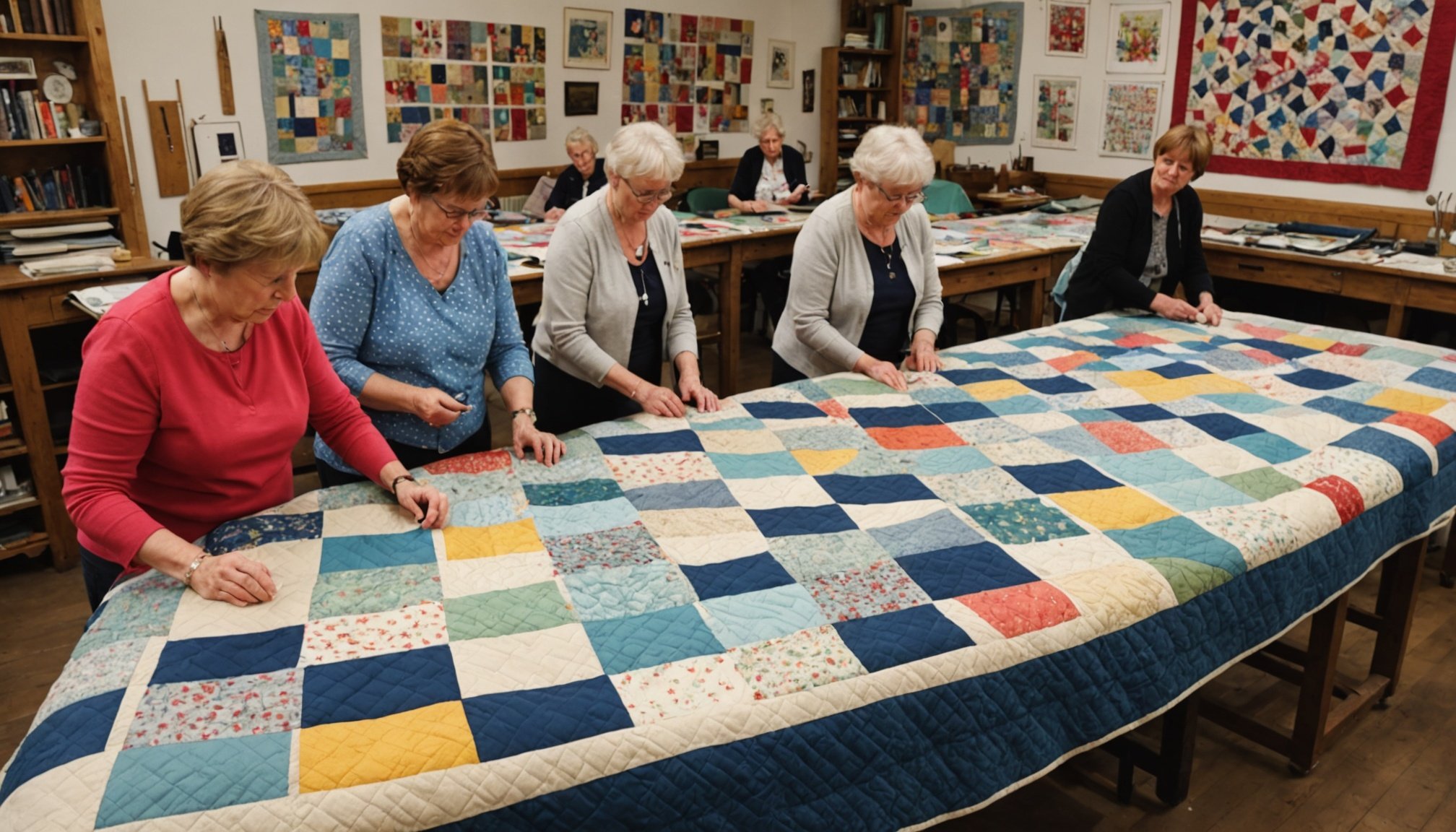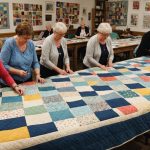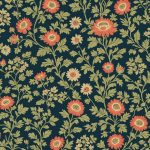Explore the charm of traditional British quilt making through immersive workshops that cater to all skill levels. These sessions not only provide hands-on crafting experience but also offer a glimpse into the rich history and cultural significance of this art form. Craft your own quilt with seasoned experts, enjoy the camaraderie of fellow enthusiasts, and create cherished memories. This guide highlights the best workshops, ensuring your journey into the world of quilting is both enjoyable and enriching. Embrace the opportunity to stitch together creativity and heritage!
Overview of Traditional British Quilt-Making
Traditional quilt-making in Britain is a craft steeped in history and cultural significance. British quilting history dates back to the medieval period, when quilts were primarily used for functional purposes, such as bed coverings and garments. Over time, quilt-making evolved into an art form, reflecting the social and economic landscapes of various eras.
Additional reading : How can visitors experience authentic Georgian dining experiences in Bath?
Quilts hold a special place in British cultural heritage. They serve as tangible links to the past, often passed down through generations as family heirlooms. These pieces not only provide warmth but also tell stories, capturing personal and communal histories through intricate patterns and fabrics. The cultural significance of quilts is further highlighted by their presence in museums and exhibitions, showcasing the evolution of styles and techniques.
There are several distinct styles within traditional British quilt-making, each with unique characteristics. Patchwork quilts, for example, are known for their geometric patterns and vibrant colours. Appliqué quilts feature decorative motifs sewn onto a base fabric, while wholecloth quilts are made from a single piece of fabric, emphasising intricate stitching. These techniques demonstrate the diversity and creativity inherent in British quilting, making it a cherished aspect of the nation's artistic heritage.
This might interest you : Explore the Art of British Wallpaper: A Guide to Immersive Workshops for Curious Travelers
Popular Regions for Quilt-Making Workshops
Exploring quilt workshops in the UK offers enthusiasts a chance to immerse themselves in regional quilting traditions. Yorkshire is renowned for its rich quilting history, with workshops that often focus on intricate patchwork techniques. The region's lush landscapes inspire many quilters, resulting in designs that reflect its natural beauty.
London, as a vibrant cultural hub, provides a diverse range of quilting workshops. Here, participants can explore both traditional and contemporary styles, benefiting from the city's access to a variety of fabrics and materials. London's workshops often cater to both beginners and advanced quilters, ensuring a comprehensive learning experience.
In Cornwall, quilt-making workshops are influenced by the region's maritime heritage. Quilts from this area frequently incorporate nautical themes and colours inspired by the sea. Workshops here offer a unique opportunity to learn about the integration of local culture into quilting designs.
For those traveling for workshops, accessibility is key. Yorkshire and Cornwall offer picturesque countryside settings, while London is easily accessible via public transport. Planning ahead and considering travel options can enhance the experience, allowing tourists to fully enjoy the rich tapestry of British quilting traditions.
Featured Quilt-Making Workshops
For those seeking the best quilt workshops in the UK, a variety of options cater to different interests and skill levels. These workshops provide immersive experiences that delve into both traditional and contemporary quilting techniques.
In Yorkshire, renowned for its quilting heritage, workshops often focus on intricate patchwork and appliqué techniques. These sessions typically range from one to three days, with prices varying from £50 to £150, depending on the duration and materials provided.
London offers a diverse array of workshops, from beginner-friendly sessions to advanced classes exploring modern quilting methods. Participants can expect to pay between £60 and £200, with workshops lasting from a few hours to a full weekend. The city's vibrant fabric markets enhance the experience, providing a rich selection of materials.
In Cornwall, workshops often incorporate local maritime themes. These sessions, usually lasting one to two days, cost between £40 and £120. The focus here is on integrating regional culture into quilting designs, offering a unique perspective on this cherished craft.
Each workshop listing provides detailed information on the types of quilting taught, ensuring enthusiasts can find a program that suits their interests and skill level.
What to Expect from a Quilt-Making Workshop
Attending a quilt-making workshop offers a rich and engaging experience, perfect for both novices and seasoned quilters. These workshops are designed to provide a comprehensive understanding of various quilting techniques through hands-on learning. Participants can expect a structured environment where they can explore their creativity and develop their skills.
Workshops typically begin with an introduction to the day's activities, followed by demonstrations of specific quilting techniques. This might include patchwork, appliqué, or wholecloth quilting, depending on the focus of the session. Throughout the workshop, attendees are encouraged to experiment and personalise their projects, fostering a sense of personal expression.
Materials and tools necessary for the workshop are usually provided, including fabric, needles, thread, and cutting tools. This ensures that participants can focus on learning and creating without the need to bring their own supplies. Additionally, instructors often share tips on selecting materials and maintaining tools, enhancing the overall workshop experience.
These workshops not only teach technical skills but also offer a supportive space for quilters to share ideas and inspiration. By the end of the session, participants leave with a newfound appreciation for the art of quilting and a tangible piece of their own creation.
Booking Information and Tips
When considering a workshop booking, it's essential to plan ahead to secure a spot in your desired session. Begin by researching available workshops and checking their schedules online. Once you've identified a workshop that aligns with your interests, proceed to the registration page. Most workshops offer an online booking system where you can select dates and make payments.
Choosing the right workshop involves assessing your skill level. If you're a beginner, look for sessions labeled as introductory or beginner-friendly. For more experienced quilters, advanced workshops offer opportunities to refine techniques and explore complex designs. Reading reviews and descriptions can provide insight into what each workshop offers.
Understanding cancellation policies is crucial. Many workshops have specific guidelines regarding cancellations and rescheduling. Typically, a full refund is available if you cancel a certain number of days before the workshop. Some may offer rescheduling options if you're unable to attend. Always review these policies during the booking process to avoid any surprises.
Planning your visit includes considering travel arrangements and accommodation if needed. Ensure you arrive with ample time to enjoy the full experience, immersing yourself in the rich tradition of British quilt-making.
Local Attractions and Amenities
Exploring local tourism while attending a quilt-making workshop can greatly enhance your experience. Many workshops are situated near fascinating attractions that provide a deeper understanding of the region's culture. In Yorkshire, you can visit the Brontë Parsonage Museum to explore the literary heritage of the Brontë sisters. Meanwhile, the historic city of York offers a glimpse into medieval architecture with its stunning York Minster.
Dining options near these workshops are plentiful, offering a taste of local cuisine. Yorkshire, known for its hearty fare, features charming pubs serving traditional dishes like roast beef and Yorkshire pudding. In London, the culinary scene is diverse, with everything from classic British fare to international cuisine readily available. Cornwall offers fresh seafood, often inspired by its maritime surroundings.
For accommodation, consider staying in quaint bed and breakfasts or boutique hotels that offer a cosy retreat after a day of quilting. Beyond the workshops, immerse yourself in cultural experiences such as visiting local art galleries, attending theatre performances, or exploring historical landmarks. These activities provide a well-rounded visit, enriching your understanding of British culture.
Testimonials from Previous Participants
Engaging with the quilting community through workshops has left many participants with positive experiences and enhanced skills. Participant reviews frequently highlight the supportive atmosphere and the wealth of knowledge shared by instructors. Attendees often express satisfaction with the hands-on learning approach, which allows them to immediately apply new techniques.
One quilter shared, "The workshop exceeded my expectations. The instructor was patient, and I left feeling more confident in my abilities." Such feedback underscores the workshops' impact on individual skill development. Many find that these sessions not only improve their technical abilities but also inspire creativity and personal expression.
Workshop feedback consistently praises the sense of camaraderie among participants. Quilters appreciate the opportunity to connect with others who share their passion, fostering a sense of belonging within the quilting community. Another participant noted, "Meeting fellow quilters was a highlight. We exchanged ideas and tips, which enriched my learning experience."
Overall, testimonials reveal that these workshops provide more than just technical instruction; they offer a space for personal growth and community building. This supportive environment encourages quilters to explore new ideas and refine their craft, leaving them eager to continue their quilting journey.
Tips for Getting the Most Out of Your Workshop
To fully embrace your workshop experience, consider these key strategies. Preparation is essential. While most quilting workshops provide materials, bringing your preferred tools can enhance your comfort and efficiency. Recommended items include a personal sewing kit, fabric scissors, and a selection of fabrics you’re excited to work with. This ensures you're ready for any spontaneous bursts of creativity.
Before attending, familiarize yourself with basic quilting techniques. This groundwork allows you to focus on honing your skills rather than grasping fundamentals. Engage in pre-workshop research by watching online tutorials or reading quilting guides. This will help you approach the hands-on crafting experience with confidence.
Networking is another valuable aspect of workshops. They offer a vibrant community of quilting enthusiasts eager to share insights and ideas. Take advantage of breaks and group discussions to connect with fellow participants. These interactions often lead to lasting friendships and collaborative opportunities.
Maximizing your workshop experience involves a balance of preparation, active participation, and social engagement. By following these tips, you’ll leave with not only new skills but also cherished memories and connections within the quilting community.
The Future of Quilt-Making in Britain
As we look towards the future, modern quilting trends are reshaping this traditional craft in Britain. The integration of technology is a significant factor, influencing both design and technique. Digital tools, like computer-aided design software, allow quilters to experiment with patterns and colours before committing to fabric. This innovation facilitates more complex and precise designs, appealing to both new and seasoned quilters.
Evolving techniques are also making their mark. Contemporary quilters are blending traditional methods with modern aesthetics, resulting in unique creations that reflect current artistic movements. This fusion of old and new is inspiring a new generation of quilters who appreciate the historical roots of the craft while embracing modernity.
For tourists, future workshops present exciting opportunities to engage with these modern quilting movements. Many workshops now incorporate elements of digital design, offering participants a chance to learn cutting-edge skills. These sessions not only teach practical techniques but also provide insight into the evolving landscape of quilt-making, ensuring that visitors leave with a deeper understanding of this ever-changing art form.
Visual Journey: Quilts and Workshop Settings
Quilt visuals play a crucial role in appreciating the intricate artistry and techniques employed in traditional British quilt-making. They offer a window into the detailed craftsmanship and creativity involved, making them an essential component of any quilting workshop. Participants often find inspiration in the vibrant patterns and textures, which help them grasp complex techniques more effectively.
Workshops frequently showcase notable quilts crafted by both instructors and attendees. These quilts serve as exemplars of the skills taught, demonstrating the potential outcomes of mastering various quilting methods. Seeing these works firsthand allows participants to set tangible goals and envision the possibilities of their own creations.
The workshop atmosphere is equally significant, fostering a sense of community and collaboration. Typically held in bright, welcoming spaces, these workshops encourage interaction and idea exchange among quilters. The environment is designed to be both inspiring and supportive, with ample room for creativity to flourish. This communal setting enhances the learning experience, as participants can observe and learn from each other's techniques, contributing to a rich tapestry of shared knowledge and artistry.
















